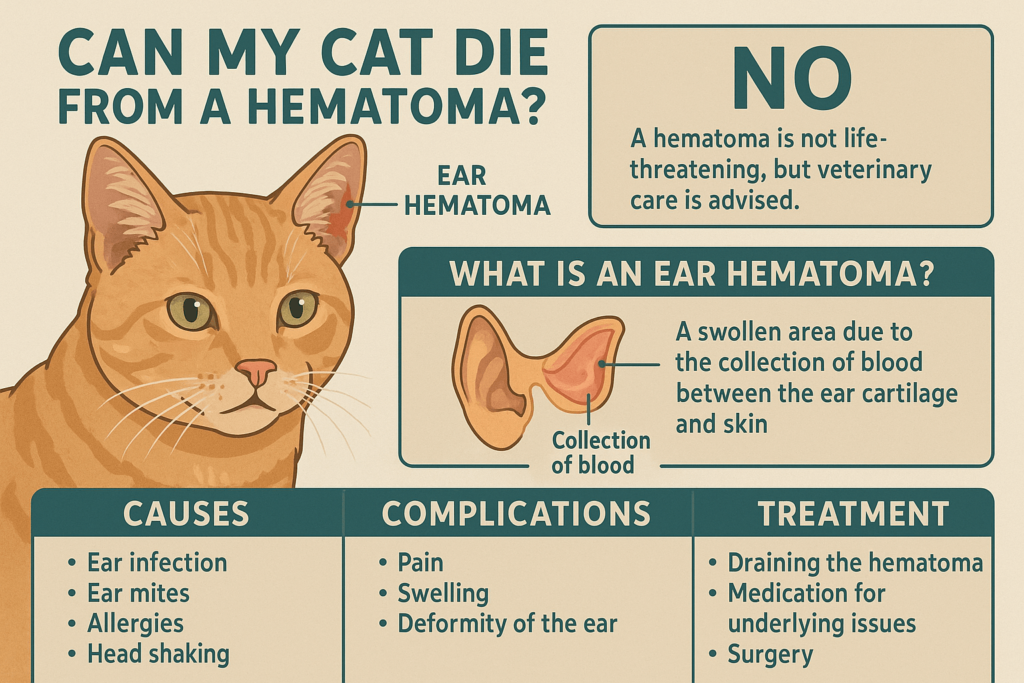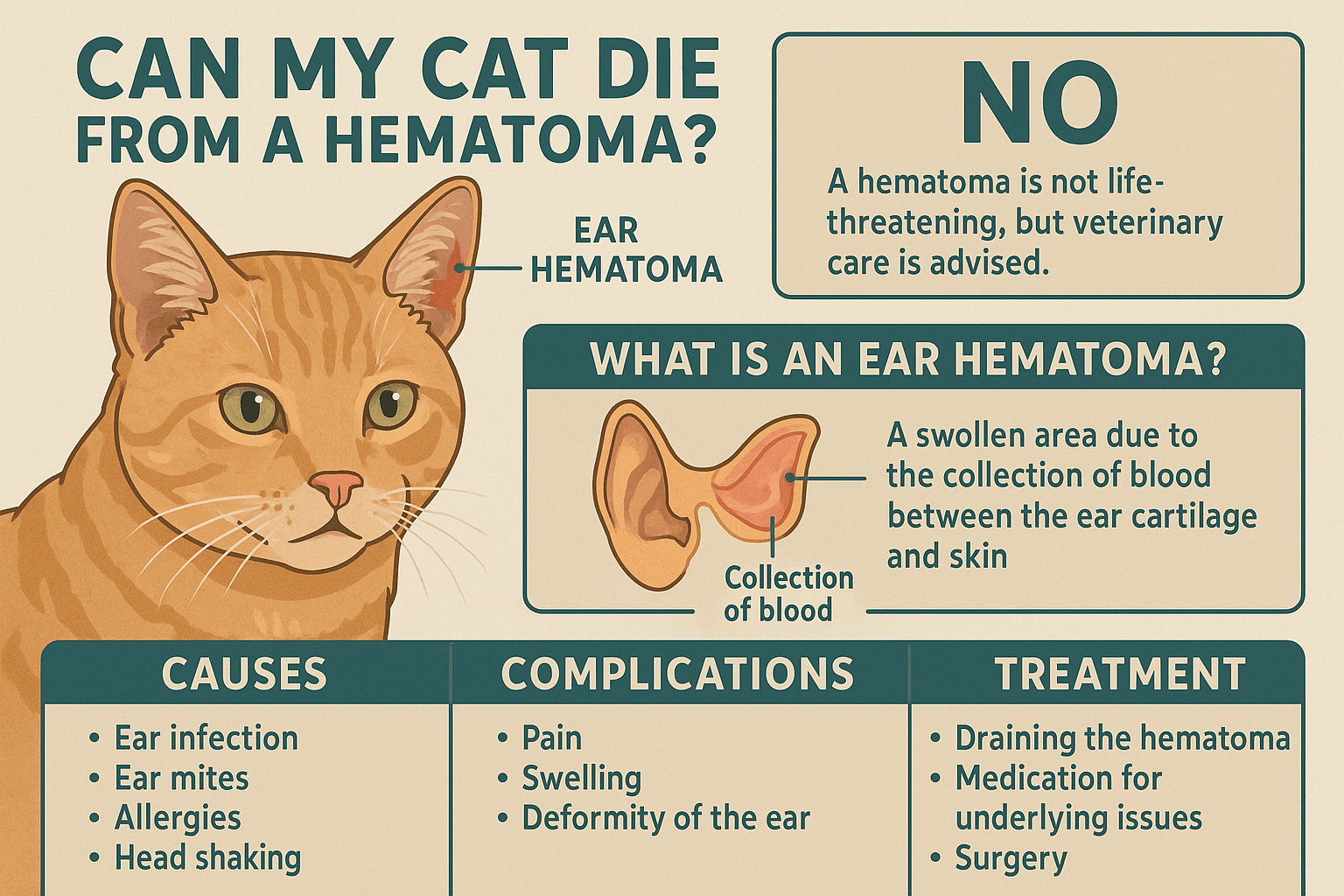Can My Cat Die from Hematoma?
A hematoma in cats is a condition where blood pools under the skin, often caused by trauma or injury. While most hematomas are not life-threatening, they can lead to complications if left untreated. Many cat owners worry about the severity of this condition and whether it poses a serious risk to their pet’s health. Understanding what a hematoma is, its causes, symptoms, and treatment options can help you make informed decisions about your cat’s care. In this blog post, we’ll explore everything you need to know about hematomas in cats, including how to prevent them and when to seek veterinary assistance.
Expert Insight: The Importance of Veterinary Attention for Hematomas
“Small hematomas could go away on their own, but in most cases, these swellings are uncomfortable to the cat and cause further irritation, so veterinary attention is required.”
What Is a Hematoma, and What Causes It?
A hematoma occurs when blood vessels rupture and blood collects in a pocket under the skin. In cats, hematomas are most commonly found in the ears but can also appear elsewhere on the body. Several factors contribute to their development, and understanding these causes can help you identify potential risks early.
Ear Infections:
Chronic ear infections can cause itching and scratching, leading to trauma that results in a hematoma.Fights with Other Animals:
Bites or scratches from other animals can damage blood vessels and trigger a hematoma.Trauma or Injury:
Accidents such as falls or collisions may cause internal bleeding that leads to a hematoma.Allergic Reactions:
Severe itching due to allergies can cause excessive scratching, increasing the likelihood of a hematoma forming.Underlying Health Conditions:
Conditions like clotting disorders or immune system issues can predispose cats to developing hematomas.
By recognizing these causes, you can take steps to minimize your cat’s risk of developing a hematoma and address underlying issues promptly.

Signs and Symptoms of a Hematoma in Cats
Identifying a hematoma early is crucial for ensuring your cat receives timely treatment. Look out for these common signs and symptoms that may indicate your cat has developed a hematoma.
Swelling or Lump Under the Skin:
A noticeable bulge or swelling, especially on the ear flap, is a hallmark sign of a hematoma.Pain or Sensitivity:
Cats may exhibit signs of discomfort when the affected area is touched or manipulated.Excessive Head Shaking:
If the hematoma is located on the ear, your cat may shake their head frequently in an attempt to relieve irritation.Scratching or Pawing at the Area:
Persistent scratching or pawing at the affected region can indicate discomfort or pain.Changes in Behavior:
Lethargy, irritability, or reluctance to engage in normal activities may signal that something is wrong.
Recognizing these symptoms allows you to act quickly, preventing complications and ensuring your cat gets the care they need.
Check this guide 👉Understanding Aural Hematoma in Cats: Best 7 Expert Tips!
Check this guide 👉Scabs on Cats Ears: Best 7 Expert Tips!
Check this guide 👉Cat Eye Injury: Best 7 Health Tips!
Prevention Tips for Hematomas | Treatment Options for Hematomas |
|---|---|
Regularly check and clean your cat’s ears | Veterinary draining of the hematoma |
Address ear infections promptly | Medication to reduce inflammation |
Keep your cat indoors to avoid fights | Surgery to prevent recurrence |
Manage allergies effectively | Pain relief medications |
Monitor for signs of trauma or injury | Follow-up vet visits for monitoring |
How Serious Is a Hematoma for Your Cat?
While not all hematomas are life-threatening, they can lead to complications if ignored. Understanding the potential risks helps you assess the severity of the situation and decide on the best course of action.
Risk of Infection:
An untreated hematoma can become infected, worsening your cat’s condition and requiring more intensive treatment.Chronic Discomfort:
Without proper care, the hematoma may persist, causing ongoing pain and distress for your cat.Permanent Deformity:
In severe cases, untreated hematomas can lead to scarring or deformities, particularly if located on the ears.Underlying Health Issues:
A hematoma may be a symptom of a more serious condition, such as a clotting disorder, which requires diagnosis and treatment.Impact on Quality of Life:
Persistent symptoms like head shaking or scratching can interfere with your cat’s daily activities and overall well-being.
Addressing a hematoma promptly minimizes risks and ensures your cat remains healthy and comfortable.
Steps to Take if You Suspect a Hematoma
If you notice signs of a hematoma in your cat, acting quickly can make a significant difference in their recovery. Here’s what you should do if you suspect your cat has developed a hematoma.
Avoid DIY Treatments:
Do not attempt to drain the hematoma yourself, as this can lead to infection or further complications.Keep Your Cat Calm:
Minimize physical activity to prevent the hematoma from worsening or causing additional trauma.Monitor Symptoms Closely:
Observe your cat’s behavior and note any changes that could indicate worsening conditions.Schedule a Vet Appointment:
Contact your veterinarian as soon as possible to discuss symptoms and arrange an examination.Prepare for Treatment:
Be ready to follow your vet’s recommendations, which may include medication, drainage, or surgery.
Taking these steps ensures your cat receives professional care and avoids unnecessary suffering.
Common Misconceptions About Hematomas
Misunderstandings about hematomas can lead to improper care or delayed treatment. Clearing up these misconceptions helps ensure your cat gets the attention they need.
“Hematomas Will Heal on Their Own”:
While some minor hematomas may resolve without intervention, many require veterinary treatment to prevent complications.“Only Outdoor Cats Get Hematomas”:
Indoor cats can develop hematomas due to ear infections, allergies, or accidental injuries.“Surgery Is Always Necessary”:
Not all hematomas require surgery; smaller ones may be treated with medication or drainage.“Hematomas Are Rare in Cats”:
Hematomas are relatively common, especially in cats prone to ear problems or frequent scratching.“It’s Just a Cosmetic Issue”:
Hematomas can indicate underlying health issues and should never be dismissed as purely cosmetic.
Understanding these facts ensures you approach hematomas with the seriousness they deserve.
Preventative Measures for Ear Hematomas
Since ear hematomas are among the most common types, focusing on prevention can save your cat from unnecessary discomfort. These measures can significantly reduce the risk of ear-related hematomas.
Regular Ear Cleaning:
Clean your cat’s ears gently and regularly to prevent wax buildup and infections.Watch for Signs of Irritation:
Check for redness, swelling, or discharge that could indicate an ear problem.Treat Parasites Promptly:
Address ear mites or other parasites quickly to avoid excessive scratching.Provide a Stress-Free Environment:
Reduce stressors that might cause excessive grooming or scratching behaviors.Consult Your Vet for Recurring Issues:
If your cat frequently develops ear problems, seek veterinary advice to address underlying causes.
Proactive care keeps your cat’s ears healthy and minimizes the risk of hematomas.
Post-Treatment Care for Cats with Hematomas
After your cat receives treatment for a hematoma, proper aftercare is essential for a smooth recovery. These tips help ensure your cat heals fully and avoids complications.
Administer Medications as Directed:
Follow your vet’s instructions carefully when giving antibiotics or anti-inflammatory drugs.Prevent Scratching or Head Shaking:
Use an Elizabethan collar (cone) if necessary to stop your cat from aggravating the area.Keep the Area Clean:
Gently clean around the treated area to prevent infection and promote healing.Limit Physical Activity:
Restrict jumping or vigorous play to allow the hematoma site to heal properly.Attend Follow-Up Appointments:
Regular check-ups ensure the hematoma is resolving and there are no lingering issues.
With attentive care, your cat can recover quickly and return to their normal routine.
Frequently Asked Questions About Hematomas in Cats
What does a hematoma look like on a cat?
A hematoma typically appears as a swollen, fluid-filled lump under the skin, often on the ear flap.
Can I treat a hematoma at home?
No, attempting to treat a hematoma at home can lead to infection or further complications. Always consult a vet.
How long does it take for a hematoma to heal?
Healing time varies depending on the size and treatment method but usually takes a few weeks with proper care.
Are hematomas painful for cats?
Yes, hematomas can cause discomfort or pain, especially if located on sensitive areas like the ears.
Can a hematoma recur after treatment?
Yes, addressing underlying causes like infections or allergies is key to preventing recurrence.
Prioritizing Your Cat’s Health When Dealing with Hematomas
While a hematoma in your cat may not always be life-threatening, it’s a condition that requires prompt attention and proper care. By understanding its causes, symptoms, and treatment options, you can ensure your feline friend remains healthy and comfortable. Whether through preventative measures, timely veterinary intervention, or attentive aftercare, taking action makes all the difference. Remember, your cat relies on you to advocate for their well-being—so stay vigilant, ask questions, and prioritize their health every step of the way. With the right approach, even a hematoma can be managed effectively, allowing your furry companion to thrive.
Why Is My Cats Second Eyelid Showing? Best 7 Expert Tips! Understand causes, health signs, and how to respond when your cat’s third eyelid becomes visible.
How Do I Know If My Cat Died Peacefully? Best 7 Expert Tips! Discover the quiet signs of a peaceful feline passing and find comfort in their final moments.
Cat Allergy Eyes: Best 7 Expert Tips! Discover why your eyes react to cats and learn proven strategies for relief—without giving up your feline friend.
Why Do Abyssinian Cat Colors Matter? Best 7 Expert Tips! Discover the genetics, rare hues, and care secrets behind Abyssinian coat colors for a healthier, happier cat.





